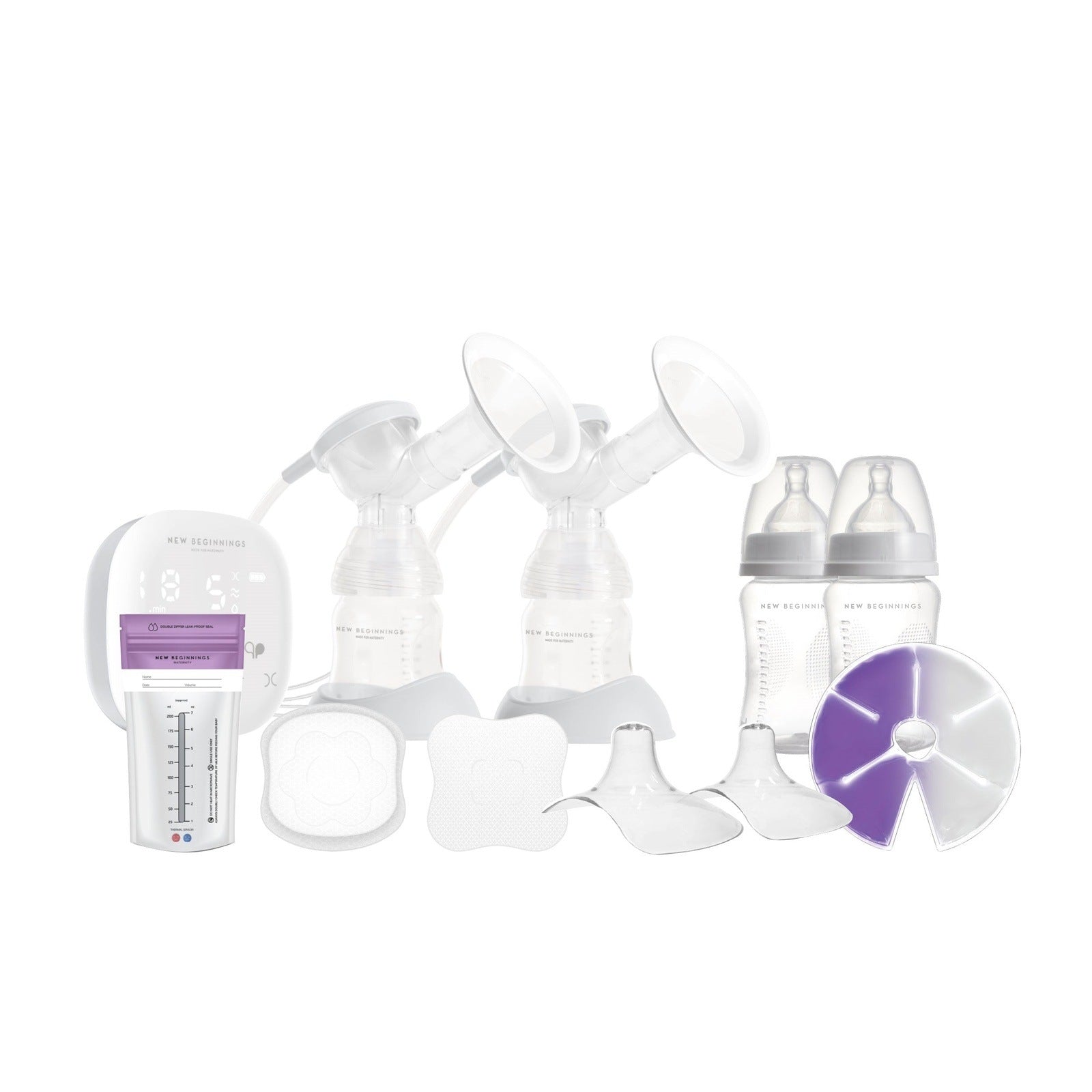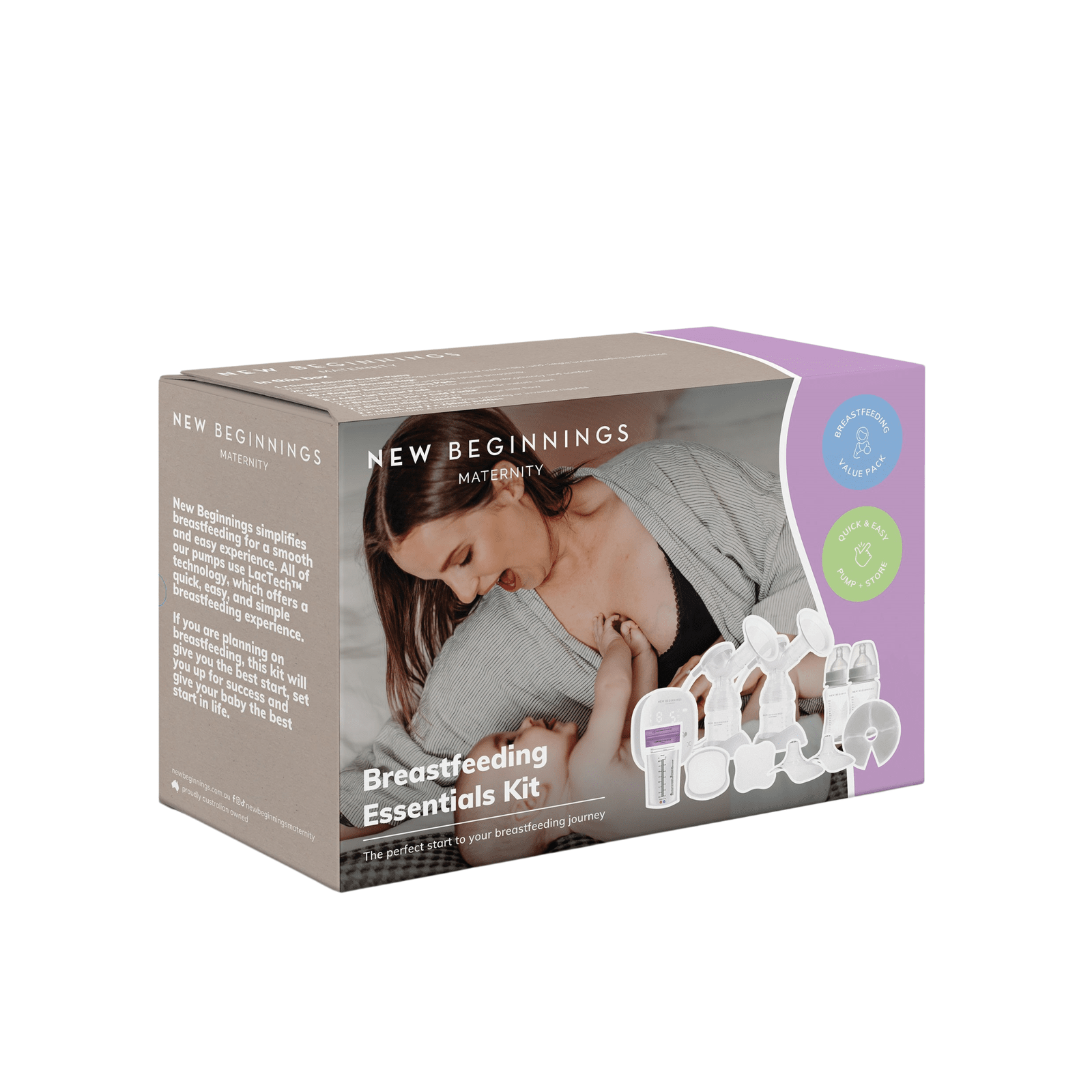How long should a newborn feed for?

When your new baby arrives, you’re bound to have a million questions. How to swaddle them properly, how to tell whether they’re sleeping enough or too much, or if they’re too hot or cold… and just what are breast pads for anyway? There’s a lot to learn about caring for your newest family member. (Don’t worry, you will get the hang of it!) But questions about breastfeeding are bound to top the list. (Read up on everything they don’t tell you about breastfeeding).
From newborn breastfeeding schedules to the right breastfeeding duration for newborn babies and how long you should breastfeed on each side, let us break down some common queries new mums have about new bubs’ feeding habits.
How often do newborns feed?
For the first two to four weeks after birth, your new arrival will likely be a voracious eater and should be fed on demand – which usually looks like every one-and-a-half to three hours or around eight to 12 times in a 24-hour period. This means you’ll need to feed them throughout the night as well as during the day. And yes, night-nursing is important – it can help your baby gain weight while also building your milk supply if you’re breastfeeding, and it’s important that your newborn doesn’t go without a feed for more than four hours. (Psst: Up late with a nursing babe? Check out our Late Night Breastfeeding Spotify Playlist) or have a listen to one of our 10 Favourite Pregnancy Podcasts.

How long should it take to breastfeed a newborn?
When it comes to breastfeeding duration for newborn babies, it’s important to remember that there is no set time. After all, every baby (and every mum!) is different. So how long should a breastfeeding session last? Newborn babies can take anywhere from 10 to 20 minutes to 45 minutes or even an hour on one or both breasts. As they get older and get better at breastfeeding (remember, they’re learning too!), they may cut that down to as little as five to 10 minutes per side. Keep in mind that all mothers have different milk storage capacities, too, meaning a baby whose mum has a larger capacity can get more milk in one sitting – and may not need to feed again as quickly.
If your bub suddenly seems to be constantly feeding, having lots of short feeds close together or wants to nurse every hour, don’t despair. This doesn’t mean there is anything wrong with your milk supply – it’s far more likely they have entered a phase of cluster feeding, which is a normal and expected part of a baby's growth.
How long should I breastfeed my baby each time?
Again, there’s no set amount of time for how long each feeding session should take. Your baby will take as long as they need, and that is perfectly normal. When they’ve had enough, there will be some tell-tale signs they’re full – they’ll detach and may seem sleepy and relaxed, or ‘milk drunk’.
But can you spend too much time breastfeeding? And how long is too long? Breastfeeding isn’t a race, so please take your time and relax – you’re doing a good job! Always remember that while some babies nurse quickly, others prefer to take their time. Newborn babies are often sleepy while feeding, which can mean things take a little longer, and it could take two or three sittings at the breast before they’re done. But if you’re concerned your baby is taking too long to feed, contact your healthcare professional or a lactation specialist.

How long should you breastfeed on each side?
Alternating breasts so that each has the same amount of time feeding each day is important, as it can help keep your milk supply up in both breasts and guard against engorgement, which can be painful. However, there’s no time limit as to exactly how long your baby should spend on each side while nursing. Nurse your baby on one side until they stop suckling, then burp them, go to the other breast and feed until your bub stops. Be sure to alternate which side you start the next feed.
While most babies will nurse from both breasts during a feed, you may find they’re satisfied after just one, and that’s okay. If that’s the case with your bub, offer the other breast first at the next feeding.
When is the best time to breastfeed?
After your baby is born, it’s great to nurse them within one hour of their birth if possible. Then, in the days that follow, aim to nurse every one-and-a-half to two hours during the day and no less than every three hours at night. This pattern has been shown to help establish your milk supply and ensure your baby is getting the right amount of nutrients for healthy weight gain and growth.
While newborns need to be fed seemingly round-the-clock, most mums have an increased milk supply in the morning, which slowly decreases across the course of the day. This makes mornings a good time to pump if you want to. (Check out everything you need to know about choosing a breast pump or view New Beginnings’ range of electric and handheld pumps.)
Of course, following the on-demand/every-couple-of-hours schedule may leave you feeling like you’re constantly nursing, especially if baby is taking their time to feed, meaning there really isn’t a “best time” to breastfeed. Feeding time is really whenever your baby needs milk. However, rather than waiting until your little one is so hungry that they’re crying, it can be a good idea to try to anticipate their needs so they don’t end up distressed (which may stress you out, too). Look out for the earlier signs of a hungry baby, for example, lip licking, sucking their hands or opening their mouth and turning their head (known as rooting).

Do I need a newborn breastfeeding schedule?
Trying to get a newborn onto a breastfeeding schedule will likely be tricky in the early weeks when you’re feeding on demand – and that is normal. Their tummies are tiny, after all, which is why they need refilling every couple of hours (and remember, feeding on demand also helps establish your milk supply). What you will need to do, though, is wake them for their regular nighttime feeding. While many newborns will wake up when it’s time for a feed, some bubs on the sleepier side need to be coaxed to nurse during the night. If your baby prefers to snooze rather than snack, wake them around every three hours, and don’t leave it more than four hours between feeds in these early days.
As your baby grows, they’re likely to fall into a bit of a feeding pattern naturally. By about four weeks, they may sleep up to five hours overnight without a feed, and at anywhere from two to four months old, you may start seeing them fall into a routine. It’s around this time you can start to introduce a sleep/eat schedule that gives you a bit more freedom to eat and sleep, too!
Looking for more breastfeeding tips and tricks? Visit our Guide to Breastfeeding Newborns: Breastfeeding Tips for New Mums.









